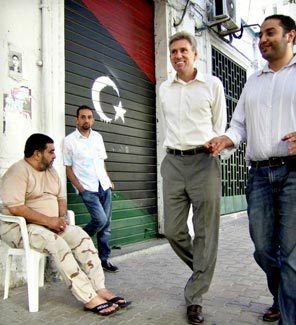http://www.dianawest.net/Home/tabid/36/EntryId/2277/The-Jihad-and-Christopher-Stephens-Pt-1.aspx

Christopher Stephens in Tripoli, June 2012
In analyzing the Benghazi scandal, it is crucial to highlight not only the dangers of relying on jihadist armed gangs for American security in Benghazi, but also the betrayal of American principle undertaken by the Obama administration in setting such a policy in place. The fact is, relying on “local militias” was not some stop-gap practice; it was official US policy. This begins to tell us why “Benghazi-gate” is so much more than an inquiry into a calamitous security break-down, and the ghastly chain of lies the administration told thereafter.
On March 28, 2012, Regional Security Officer Eric Nordstrom sent a cable from Libya requesting more security. His request was denied. This cable, however, is evidence of more than State’s negligence in failing to address a dangerous security situation that would be exploited by al Qaeda affiliates on September 11, 2012. In the cable, Nordstrom makes note of the fact that “rebuilding and expanding post’s PSA Local Guard Force” was one of his “core objectives.” Further: “As recommended by the Department, post is developing plans to transition our security staffing… to [a model] that incorporates more locally-based and non-emergency assets.”
Naturally. these “plans” weren’t working. Hence, Nordstrom’s request for more American security. And hence the denial from State for reasons, Nordstrom recently told Congress, that came down to the fact “there was going to be too much political cost.” But what politics drove such a recommendation? Here is where the entire Libyan debacle, the debacle of “Arab Spring” — Arab Jihad — comes into play. It is time to reckon with the fact that despite the grand talk of democracy and human rights, President Obama ordered Uncle Sam to join that jihad in 2011, precipitously pulling support from a long-standing ally in Egypt and a post-9/11 ally in Libya to empower the vanguards of liberty-supressing Islam, extending the reach and dominion of a hostile, totalitarian system.
Obama was hardly alone, drawing support from left-wing Democrats, the UN crowd, media, the GOP establishment, George W. Bush, “neocons,” all of whom boosted this same “Arab Spring,” often for different reasons. One of the great champions of what we should start thinking of as the jihad outreach such a policy necessarily entails was the late Ambassador Christopher Stevens, and long before he arrived in Benghazi during “Arab Spring.”
Thanks to Wikileaks, we have a series of US Libyan embassy cables, starting in December 2007, which document what became rather an abiding interest in two repatriated ex-Guatanamo detainees, Ben Qumu Abu Sufian Ahmed Hamouda and Muhammad Abdallah Mansur al-Rimi — ben Qumu in particular.
For the next six months or so, cables, some by Stevens, some by other personnel, track embassy access to these detainees, their condition, and their welfare in their Libyan detention. One cable (not by Stevens) details an extended family visit to Qumu. His relatives, the cable reports, “were able to bring some food, clothes, personal hygiene items and reading materials to him. Tarnish [a security officer] described [Qumu’s] physical condition and spirits as `very good’ and indicated that security officials at the facility… had allowed the family to stay with him for a few extra hours in light of the impending New Year’s holiday.”
Why the solicitude for a high-ranking al Qaeda member with connections to a terror financier? Ben Qumu, a native of Derna in eastern Libya, rose in the al Qaeda ranks after training at an al-Qaeda camp in Afghanistan in the 1990s, reportedly serving under bin Laden in Sudan after which he fought with the Talban. He was captured in 2002 along the Af-Pak border and sent to Gitmo before being repatriated to Libyan custody in 2007. He would be released in a Libyan government reconciliation program in 2010.
Another cable, this one by Stevens on June 6, 12, 2008, assesses the attitudes of ben Qumu and al-Rimi toward their new prison, Abu Salim, compared to their old facility, known as ESO. They both “expressed a desire to return from Abu Salim prison to the ESO facility,” Stevens wrote.
Why did Stevens care? Why was the US Embassy so concerned? Something else I wonder is who among the diplomats who served with Stevens has made the connection between Stevens’ interest in ben Qumu in 2008 and news reports identifying ben Qumu as the leader of the terrorist attack in which Stevens and three other Americans were murdered.
This US government report on al Qaeda infiltration of Libyan militias further identifies Qumu as a leader of Ansar al Sharia, the group believed to have led the consulate assault.
It’s a stunning, sickening circle, but it is also the noxious metaphor for the deadly course of Uncle Sam’s outreach to jihad.
To be cont’d.









